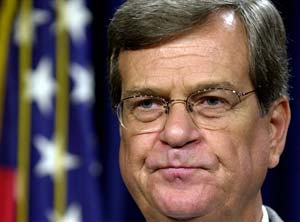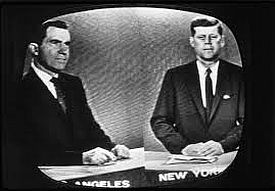Politics Without Honor
From The New CriterionThe Honorable Justice Antonin Scalia
Prominently featured in Ted Cruz’s radio ads heard in the run-up to Super Tuesday was the asseveration that “Trust is everything.” That was where he made his big mistake. In the world of post-modern politics, a world in which Donald Trump and Hillary Clinton were then already seemingly on the glide path to winning their parties’ nominations for the presidency, trust was, if not nothing, at best not counting for very much with voters, except maybe in Texas and a few other places. Mr Cruz was trying to induce his would-be supporters to reach back into an increasingly hazy folk memory of a time when politics was still connected with traditional notions of the “honorable” — a word now surviving only as an honorific before a congressman’s or senator’s name. “Honorific” means bearing honor, but nobody, including Ted Cruz, has a very clear idea of what honor means anymore.
Like trust, to which it is closely related, it is not something you get just by saying you have it. It has to be conferred on you by a group of your peers, to whom you give the right to judge you. How trusted is Ted Cruz by his Republican senatorial colleagues? They loathe him, virtually to a man. If he’s not trusted by those who know him best, how can he expect to be trusted by voters to whom he is mostly a stranger? In his ads, Senator Cruz also boasted of having “stood up to” his own party in Congress. Perhaps he was thinking of the time he used what would once, in days of honor, have been considered grossly unparliamentary language and called his party’s leader in the Senate a liar? He was very free with similar accusations against both Mr Trump and his main rival for second place, Senator Marco Rubio. Now, it seems, there is not even a folk memory of the time when such language would have involved him in a challenge to mortal combat.
Clearly, Senator Cruz is banking on weakened ties of party loyalty among Republican-leaning voters, voters who themselves feel like “standing up to” the party which they believe has let them down. But in that case it should not be “trust” that he emphasizes but his willingness, like any Snowden-type “whistleblower,” to violate trust for principle’s sake. Not that that is likely to do him much good either. Neither trust nor principle is a word that even their supporters associate with Hillary Clinton or Donald Trump. In Mrs Clinton’s case the appeal is arguably an honorable one, since she is felt to have been strongly loyal to two of the Democrats’ largest and most important constituencies, progressive blacks and women. Loyal to a fault, some might say. Mr Trump revealed in one of his many “Tweets” that he couldn’t even spell “honor,” but those who vote for him admire him for the kind of authenticity encapsulated in the expression: “He says what he means.” Somehow it doesn’t seem to matter so much if there remains a doubt that he also means what he says.
Mr Rubio was not quicker than Mr Cruz to pick up on this aspect of his rival’s appeal, but it was bigger news when the man Mr Trump had ridiculed for his less than manly innocuousness suddenly started hitting back during and after the tenth television “debate.” The media’s view was divided between those who cheered him for it (a fight is always good box office) and those who thought that Senator Rubio had lowered himself to the Trump “level” — though if voters didn’t mind the Trump level for Trump, he must have thought it unlikely that they would mind it for Rubio. The candidates had already acquiesced in the media’s view of the struggle between them as a reality-TV-style knockout contest, so it wasn’t that big a step for it to descend just a bit further into the old-style Trumpian flyting contest that, if it had taken place on the street and among a people who tend not to vote Republican, would have been called “the dozens.”
The bien pensant, of course, couldn’t stop their tsking about the childishness of it all. Richard Cohen of The Washington Post even took it upon himself to reach still further back into the past and disqualified Mr Rubio from the presidency for a lack of “decorum,” albeit with an uneasy sense of his own ridiculousness in doing so. Even the new-minted believers in decorum — last heard from when Bill Clinton was president and a sense of decorum all round could have done him some good — must have secretly welcomed the insult contest as adding to the entertainment value of the campaign and only wished that it might have involved more wit and less crudeness on either side. Either way, however, it could only have confirmed what most people already knew, namely that our political culture is now nine-tenths entertainment and ten-tenths vulgarity.
Decorum is another word that, like honor, is so far estranged from its original meaning that it can now only be used — and therefore used wrongly — for partisan purposes. Now, like politeness (see “Manners Makyth Man” in The New Criterion of January, 2016), it’s always the other guy who lacks it, never a rule to discipline ourselves. In this it is also like the “lies” that the other guy, so we’re told (especially by Ted Cruz), is always telling. But that’s why the public has already learned to discount the charge, however plausible, as motivated by partisanship — which is why, in turn, those who have hurled it at each other so promiscuously during the campaign have seemingly gained no political benefit from doing so. Besides, the public has already had to cope with rather heavy demands on its dwindling reserves of outrage.
The death of Antonin Scalia in February and the shamelessness with which both sides in the battle over President Obama’s prospective attempt to name a successor contradicted their own positions in past years provided another recent example of the hopelessness of trying to reintroduce any notion of honor or decorum back into “The Circus” — to use the non-ironic title of Showtime’s series of campaign documentaries — of American politics. Back in 2007, when it looked possible that President George W. Bush might have a chance to nominate a third justice to the Supreme Court, Senator “Chuck” Schumer of New York, now heir apparent to Senator Harry Reid as Democratic leader, had insisted, according to Politico, that Senate Democrats, then in the majority, should not allow the Court’s “balance” to be thus upset. Likewise, according to The New York Times, Vice President Biden had said something similar in what turned out to be the last year of the first Bush administration, in 1992. Now, both men strongly denied that they had said what they clearly had said. “One’s apples, one’s oranges,” said Senator Schumer. The Vice President, according to the Times, “issued a statement saying that his remarks had been misinterpreted, and stressing that he believed, then and now, that the White House and Congress should ‘work together to overcome partisan differences’ on Supreme Court nominations.”
Nice one, Joe! Just like, when you were in Congress, you worked to overcome differences with the White House over the Robert Bork and Clarence Thomas nominations, I take it. There are good reasons for supposing that it is to Mr Biden himself that our thanks are due for the bitter partisan battles over judicial confirmations of the last 30 years, which date from his assumption of the chairmanship of the Senate Judiciary Committee in 1987. But what of that? His denials now are of a piece with his partisanship then, and both are examples of a lack of capacity for self-detachment and self-irony, qualities that have gone out of our politics, not coincidentally, along with honor and decorum — and wit. Now there is only the increasingly bitter partisanship of the Manichaean struggle between light and dark, of which the incipient war of the Scalian succession is only the latest theatre.
The media, who make money from the passions thus stirred, characteristically issue their call to arms in the name of opposing not Republicans as such but Republican partisans or extremists. Linda Greenhouse, who covered the Court for The New York Times for nearly 30 years wrote for the Times of Scalia’s death that
Fate has handed the justices a chance to hit reset. If that seems an uncharitable, even tasteless observation, so be it. I’ve become increasingly concerned, as my recent columns have suggested, that the conservative majority is permitting the court to become an agent of partisan warfare to an extent that threatens real damage to the institution. Justice Scalia’s outsize role on and off the bench contributed to that dangerous development to an outsize degree.
In other words, the Court is becoming an arena for political partisanship and it’s all the fault of the other side! The absurdity of that proposition is at least as striking as it is in Messrs Schumer and Biden’s retrospective explanations of what they really meant by saying that a (different) president should not have a chance to nominate another justice in his final year in office. Ms Greenhouse’s absurdity is imperfectly masked by the long-standing but increasingly threadbare pretense of the Times’s (and her own) non-partisanship. But even those who still subscribe to that polite fiction of the governing classes ought to be able to see the mean-spiritedness of such an attack on the recently deceased. Ms Greenhouse, rather charitably to herself, herself calls it “uncharitable.”
In the same spirit, Lawrence Tribe, blogging at length for The New York Review of Books pays tribute to the sharpness of Justice Scalia’s legal reasoning but denies that he was the “originalist” he claimed to be. He was, it seems, as guilty as the next justice — nay, guiltier! — of finding in the Constitution only what he wanted to find there. It is not enough for Mr Tribe to claim that the late Justice was an enemy of those, like himself, who advocate “the just and inclusive society that our Constitution and laws should be interpreted to advance rather than impede.” No, he must also deny that Scalia could claim any principle, anything but his own personal preferences — presumably for an unjust and non-inclusive society — in opposing these things and, with them, the tribe of Tribe.
There is a kind of totalism, not to say totalitarianism, about such polemics that has been more and more in evidence in the media over the last decade or so. It may be described as an adaptation of the media’s “Bush Derangement Syndrome” of the waning years of the last administration to the age of Obama. Peggy Noonan wrote of it, also a propos of Justice Scalia, in The Wall Street Journal:
There is something increasingly unappeasable in the left. This is something conservatives and others have come to fear, that progressives now accept no limits. We can’t just have court-ordered legalized abortion across the land, we have to have it up to the point of birth, and taxpayers have to pay for it. It’s not enough to win same-sex marriage, you’ve got to personally approve of it and if you publicly resist you’ll be ruined. It’s not enough that we have publicly funded contraceptives, the nuns have to provide them. This unappeasable spirit always turns to the courts to have its way.
Progressives, that is, have become the captives of their own conceit — not just that their political views are the only correct ones but that they are the only moral ones. To oppose them, therefore, is not just to be in error but to be scandalously indecent. Obviously, there can be no compromise with hatred and bigotry or with the evil that, ex hypothesi, characterizes the other side. Thus the absurdities unconsciously embraced by Chuck Schumer or Joe Biden, the meanness and bitterness of Linda Greenhouse or Lawrence Tribe, are all comprised in this original absurdity, this foundational meanness of progressivism, which wouldn’t be progressivism if it had any capacity for self-examination or self-doubt.
Peggy Noonan goes on:
If progressives were wise they would step back, accept their victories, take a breath and turn to the idea of solidifying gains, of heroic patience, of being peaceable. Don’t make them bake the cake. Don’t make them accept the progressive replacement for Scalia. Leave the nuns alone. Progressives have no idea how fragile it all is. That’s why they feel free to be unappeasable. They don’t know what they’re grinding down. They think America has endless give. But America is composed of humans, and they do not have endless give. Isn’t that what we’re seeing this year in the political realm? That they don’t have endless give? And we’ll be seeing more of it.
She doesn’t say so, but the implication is clear: if there isn’t “endless give” in the American people to the progressive agenda, the evidence of it is Donald Trump, who appeals to shockingly large numbers of people in spite of (or perhaps partly because of) his manifest shortcomings as a man and a candidate, mainly because they see him as someone who can stop, if anyone can, the progressive juggernaut that the other candidates are mostly too polite (or too cowed by the media) to call attention to, let alone criticize.
Actually, Mr Trump seldom calls attention to it either, though not because he is cowed by the media. Rather, he is media-savvy enough to know that he will pay no price to show by his words and deeds his contempt for “political correctness” while otherwise confining himself, for the most part, to emotional appeals to “Make America Great Again.” But it is the media and the political culture which they lead that have reduced our politics to this raw emotional level, from Barack Obama’s meaningless “Hope and Change” to Hillary Clinton’s vacuous “fighting” for the “hard working” middle class — who, asks Barton Swaim, will fight for the lazy? — to Bernie Sanders’s fantastical “revolution” to Donald Trump’s Greater America. By comparison to the others, the Trump slogan almost sounds substantive.
In the past when America has substituted morality for honor in politics it has generally been because she wants to go to war. It always helps to bring the masses along if the other side can be portrayed as the devil. And sometimes it looks as if we may be headed that way again. As early as the Tea Party rallies in the first Obama term, Lee Harris was writing of The Next American Civil War. But war or no war, from the media’s point of view the beauty of emotional politics lies in its inclusiveness, to adapt Lawrence Tribe’s great desideratum. While it takes an effort to think, anyone can feel angry. As in so many other ways, Donald Trump is simply using the media’s own weapons against them, conjuring up a whole new and hitherto unsuspected set of scandals to embroil those who oppose him and make them forget about those that might otherwise be crippling to him. That kind of tooth-and-nail partisanship is what the old and now all-but forgotten honor culture evolved over centuries in order to obviate. We can’t now hope to recover it with the end in view of its serving our partisanship. Not that either Ted Cruz or Linda Greenhouse is ever likely to understand that.
Discover more from James Bowman
Subscribe to get the latest posts to your email.







